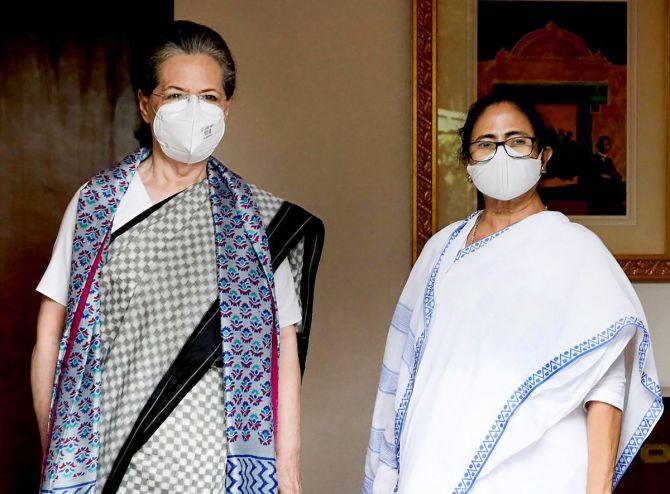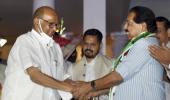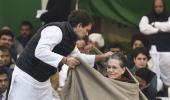What we have in the Congress is a useful glue to hold a non-cultural, unified Opposition together.
That is the sacrifice the Congress must be willing to live with if showing the BJP the door is what the collective Opposition wants, observes Shyam G Menon.

The days following her quip in Mumbai that there is no United Progressive Alliance must have given Mamata Banerjee a sense of what the Congress means and where the Trinamool Congress stands.
For the electorate, what is the Congress in experiential terms?
Continuity and middle ground
The Congress is our link to a politics that authored the contours of modern India.
Post 1947, we had the Constitution to protect our rights, English to gloss over our internal cultural differences, respect for education and the pursuit of money/market to keep ourselves welded together for practical purposes.
In this space, the Congress was the scarred veteran.
As a prominent symbol from the freedom struggle, it harvested the credit for what went well post-Independence, and the blame for what didn't.
Opposition of scale took time to form.
In select states, the Left parties and strong regional outfits found traction.
The Left was closer to ground reality than the Congress and hence sensitive to economic and social inequalities.
Its roots stayed in political -- not religious or cultural -- texts.
In the mid-1970s, the Emergency tarnished the Congress's reputation.
Thereafter, non-Congress parties still partial to socialism had periodic stints in power, leading up to regimes featuring the Congress (by then advocating economic liberalization) and its allies, supported by the Left.
On the other hand, for the Congress's current nemesis, the Bharatiya Janata Party, backing something distinctly religious and cultural in flavor, was the gamechanger.
After its initial electoral foray yielded poor results, the BJP backed the Ram Janambhoomi movement to succeed.
By the second decade of the 21st century, this resurgent Right-Wing -- starting with the relatively tolerant regime of Atal Bihari Vajpayee and then the polarising policies of Narendra Damodardas Modi -- had altered India's political landscape.
They dismissed the English-speaking lot as Macaulay's children and replaced the external view of country for adhesive, with an internal gaze founded on majoritarianism.
To stay above question, they positioned themselves as patriots and nationalists; they also labeled those who disagreed as lacking those virtues.
However, there is a problem if you pursue the route of cultural cohesion/domination by majority.
It is in the nature of identity politics to keep on evolving in manners that rebel against the push to color in one shade.
Even the English-speaking are not free of this dynamic.
The English in England know how distinct they are in their separate localities.
And the cluster that is England, Ireland, Wales and Scotland know how strongly each feel about themselves.
They also probably know how Europe and the European Union work as external counterpoint to sink differences on the isles.
BJP -- in a fix
Similarly, the BJP is a party that is popular in the northern parts of India with forays into other regions that precipitated toxic tussles with previously brokered local peace.
Almost everywhere the Right-Wing poked its nose into, communal tensions followed.
Its tendency has been to usurp for the majority (and thereby itself as self-appointed guardian of said majority) the people's capacity to co-exist shaped through the centuries.
It knows that uniting India under such a culture -- delineated and credited to the religion of the majority -- is unrealistic, which is why it cozies up to the corporate lobby for symbiotic survival and frequently drums up external threats as alternative route to unite domestically.
It knows that religion and culture work only as tactic, not strategy.
This is why within the ecosystem of India's biggest religion, the Right-Wing has attempted to cast Hinduism in line with church and clergy-led patterns.
Centralised voice replacing the individual's ability to decide and choose is the only way cohesion can be coaxed from religion.
Simply put, the Right-Wing loves command structure with authorised influencers as construction tool for a state according to its ideals.
It is deeply suspicious of the free, uncategorised mind, a stance that endears it to corporates, who in their pursuit of money, prize focused vehicles of delivery more than freedom.
The other segment supporting the Right-Wing has been the wealthy lobby of overseas Indians.
Congress -- time for rethink
By sole virtue of it being the party most identified with India's Independence, the Congress has the benefit (deserved or otherwise) of signifying the non-religious space.
To a greater degree in spirit and commitment, and to a lesser degree as regards extent of influence, the Left parties too enjoy this.
In the real world, reduced to depleting presence in West Bengal and hanging on to power in Kerala, the Left would seem a bunch of regional parties.
But that isn't how their politics is perceived.
People don't survive on religion and culture.
The basic needs of life are different and the Left rarely lost sight of that.
This is also why those leaning Left in India, usually do so because they believe in an inclusive, equitable world and not because they are seeking a victory or even seeking to be badged Left.
The Congress, however, hasn't always stuck to the non-religious prism.
Over the years, it did its bit to indulge religion and culture to secure popularity, a track record, which haunts it.
There is also the specter of party inseparable from the Nehru-Gandhi family.
As for the Left, allegations of nepotism have flourished in states that witnessed prolonged Left rule (given matching physical structures, the Left and the Right have similar health problems).
More immediately, one is unsure if the Congress understands that once the non-religious prism goes, so does the party.
In other words, at times of prism threatened, the Congress cannot sit on a high horse and talk down to regional outfits like the TMC, who appear better motivated to take on the BJP (provided that is what the TMC really wishes to do).
So, in the end, what we have in the Congress is a useful glue to hold a non-cultural, unified Opposition together.
Everyone wants a piece of it because it is the livable middle ground.
Now we know, the cement that holds the bricks together stays in the grooves.
And when it is outer protective layer, cement even gets painted on.
That is the sacrifice the Congress must be willing to live with if showing the BJP, the door, is what the collective Opposition wants.
No room for gimmicks
Where does this leave Mamata Banerjee and her offer to lead? As of December, 2021, she isn't the only contender from the Opposition, an array of mostly regional parties, whose leaders seek national leadership because they are strong in their respective home turfs.
Tempting as it may be to discount the Opposition as regional, their regional strength saps the national stature of the BJP.
The latter becomes the face of a central government treading the waters of an ever-strengthening federalism.
The religious and cultural themes, which the Right-Wing has been fanning of late (ahead of 2022 state elections), are proof of its insecurity.
As is its willingness to use government machinery to silence its critics.
This doesn't mean Advantage Opposition.
The electorate knows well that the Opposition is still a bunch of regional satraps trapped in family and ego.
It will not treat the Opposition as a force to reckon with unless it builds up credible solidity, the first rung of which would be convincing good work by the regional parties concerned, in their respective states.
This, and timing the disclosure of opposition leadership, are key to put up a serious fight in the 2024 general election.
Right now, for Ms Banerjee or anyone else to assert themselves nationally -- it is premature.
Further, while it may be a poorly functioning Congress that is everyone's target to replace, the instincts at play draw inspiration from the BJP.
The Right-Wing deserves credit for showing how an emotional agenda having little relevance to humanity's core needs could be leveraged to garner votes.
The BJP is also the first major Indian political party, whose triumph was helped in no small measure by social media, a soulless entity using algorithms and influencers to popularize any trash fed into it.
And lest we forget -- there is the growing stature of political strategists and their vindication by seats won, to contend with.
If the Opposition parties are firing prematurely for national leadership now, it comes from the misplaced confidence that the victories by irrelevance and crafty formula, effected earlier, can be repeated.
The biggest social media company around has changed its name and focus.
And Indian farmers have shown that a campaign can succeed through grit, without recourse to high profile consultant or strategist.
Shyam G Menon is a Mumbai-based columnist.
Feature Presentation: Aslam Hunani/Rediff.com










